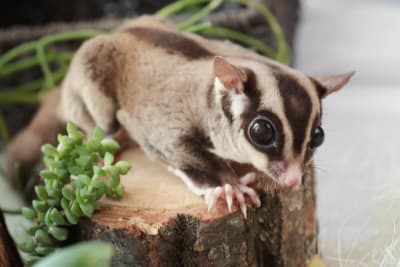Sugar gliders can be excellent and rewarding companion pets. However, these clever, curious, and social marsupials require a significant amount of specialized care, nutrition, and plenty of socialization time to make sure they stay healthy and happy. Here, our South Wilton vets explain some of the considerations you should have if you're thinking about having a sugar glider as a pet.
About Sugar Gliders
While they may look like rodents, sugar gliders are marsupials like koalas and kangaroos. They have pouches for carrying their young and folds of skin that stretch from their wrists to their sides which allow them to glide from tree to tree in the wild.
Sugar gliders are nocturnal—meaning they are only active at night— and generally weigh between 2.5 and 5.5 ounces. Wild and "classic" sugar gliders have a distinctive black dorsal stripe and a white belly, while ones bred in captivity can have many different fur colors and patterns.
Sugar gliders in the wild live in groups of 6-10 and are very social, living on average for 6 to 7 years.
Are Sugar Gliders Good Pets?
Sugar gliders are available from breeders, pet stores, and shelters across the United States and make excellent exotic pets. These creatures are caring, social, and curious, often closely bonding with families for life.
However, they are quite time-intensive as pets and our South Wilton vets advise you to take some time to learn about them and their needs before considering getting one as a companion.
But what are the needs of sugar gliders as pets?
Bonding
You may have heard that there is a bonding—or taming—process involved in introducing sugar gliders to life as companion animals.
They require daily handling and play to become comfortable with their owners, otherwise, they can become nippy. because of this, sugar gliders may not be excellent pets for families with young children.
With their natural affinity for pouches, sugar gliders often will curl up in a pocket or specially-designed sugar glider pouch.
Housing and Stimulation
Sugar gliders require a large cage to let them get exercise by jumping, leaping, and gliding around. The bare minimum size of the cage is generally considered to be 3' by 2' by 3'. Sugar gliders also have a deserved reputation as escape artists, so make sure the bars aren't too far apart.
Your gilder's cage should include several platforms, toys, and stimulating activities like bird toys, swings, and rodent wheels.
As well, you should rarely have only one sugar glider as a pet. These creatures are incredibly social by nature, so on top of daily handling and play, they will need a companion to keep them company.
Nutrition
Sugar gliders are omnivores and have quite specific nutritional habits that need to be met to allow them to stay healthy.
Despite what you might think, sugar gliders eat very little fruit as part of their diet.
And, while there is no ideal sugar glider diet, it's generally a safe bet to divide their diet into 3 parts. Half of their daily intake can be commercial pellets, a quarter should be green, left vegetables and the final quarter is a protein like cooked egg, lean meat, and insects.
Regardless of the specifics of your sugar gilder's diet, diversity and variety are critical.
Medical Needs
Sugar gliders, just like any other pet, are susceptible to various conditions and illnesses. Some of the most common of these found in sugar gliders are dental health issues, weight problems, and stress-related diseases.
Issues like oral health and weight issues often stem from improper nutrition. Overly sugary foods can cause obesity and tooth decay in your sugar glider and an improper diet can just as easily cause malnourishment.
Likewise, if you don't give your nocturnal sugar gliders ample chance to sleep throughout the day, they will often develop stress-related disorders and conditions.
Despite requiring many special considerations and plenty of time and attention, sugar gliders can be excellent, loving, and playful pets. Contact our South Wilton Veterinary Group team for more information about sugar gliders as pets.
 Looking for a vet in South Wilton?
Looking for a vet in South Wilton?
We're always accepting new patients, so contact our veterinary hospital today to book your pet's first appointment.
Related Articles View All
C-Section for Dogs: Everything You Should Know
Our South Wilton vets share some information about c-sections in dogs, when they might be needed, and what you can expect.
Enucleation: Eye Removal in Cats & Dogs
Learning that your cat or dog needs eye removal surgery can be upsetting, and you'll probably have many questions. Our veterinarians in South Wilton explain pet eye removal, recovery times, potential complications, and more.
Understanding Blood Tests for Dogs
Dogs and cats often require diagnostic blood tests to reveal vital health information about underlying health conditions. In this post, our veterinarians at South Wilton explain the significance of these tests for pets.
What Are the Symptoms of a Spider Bite on a Dog?
In some cases, the spider bites our South Wilton vets see on dogs cause serious symptoms that necessitate immediate medical attention; however, most spider bites on dogs cause minor irritation but are generally harmless.

